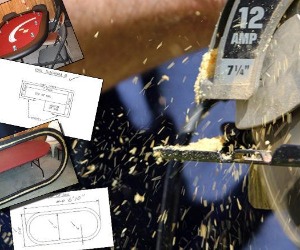Wearing Sunglasses and Headphones at the Poker Table

You see them all the time in poker rooms — for at least 20 years or more. Many players wear them. Maybe you wear them. I'm talking about sunglasses and headphones (or earbuds). If you don't wear them, should you? If you do, are you better off without them?
I'll tell you this. I used to wear sunglasses. The reason to wear them seemed obvious.
One of the ways to get an advantage over opponents is to recognize tells — unconscious behaviors that would tend to give away the true strength of their hand. I'd learned that many forms of tells involve the eye movement of my opponents.
An opponent who stares at the flop, for example, often has missed it and is searching it extra long to see if he can't recognize something in it to his advantage. Similarly, a player who glances quickly at his chip stack when the flop hits has often hit the flop hard and is thinking about how much to bet. You can probably think of many other tells that are based on eye movement.
That being the case, since the eye movement of my opponents could help me, it only stood to reason that shielding my eyes from their prying inspection by wearing eye covering of some kind — like sunglasses — only made sense. I'd be depriving my opponents of the advantage that I might otherwise be giving them.
There were other advantages to wearing sunglasses. For one thing, sunglasses would obscure the object of focus of my own eyes. My opponents wouldn't be alerted to my staring at them. I could look at them forever to see what they were looking at and how they appeared, and without my stare being detectable. That was surely an advantage.
Meanwhile the advantages of wearing headphones were also known to me, though I never indulged.

Chatter at the table can be distracting, or at least annoying. By listening to music during the play of the hand I would be freed from the endless back and forth of idle chit-chat. I would not be tempted to distract myself by indulging my own urges to yap back and forth. This would force me to concentrate more on the play of the hand, helping me to focus on all of the many things I needed to think about — e.g., my opponents' stack size, the pot size, their style of play, my image in their mind, and so on.
Just as sunglasses gave me an advantage by shielding my eyes from my opponent, so, too, would the steady relaxing sound of music shut out the inane and sometimes infuriating conversations that take place at the poker table. I could more easily enter my ideal mental playing zone — something that is surely advantageous.
But over the years, after wearing sunglasses while playing, and making many observations of players with both sunglasses and headphones, I've discovered that the disadvantages of wearing sunglasses and wearing headphones outweighs the considerable advantages. At least it does for me. Let me tell you why.

You can build your DIY poker table with just some plywood, foam, and felt. But it's not as easy as that; there's more to it. Building your own poker table encompasses a lot, so read this before you get going, as we bring you the do-it-yourself guide to building your own poker table.
Play NowWhen hidden behind sunglasses, my eyes will not betray any tells. However wearing sunglasses also inhibits my ability to engage my opponents in conversation. Similarly, wearing headphones greatly restricts my ability to carry on any kind of a conversation with people at the table. For me at least, this is an enormous disadvantage.
Consider what can be gained in conversation. First of all, it tends to bring people closer together. I'm not saying that the frequently superficial conversation that goes on at the poker table is always sufficient to form lasting friendships. But it does make people feel better about you than if you are a silent cypher sitting next to them.
Even cursory friendliness — the type that develops when two strangers chat with each other about themselves — is often sufficient to get opponents to play more softly against me. I've seen it. And I've used it to my advantage.
That's why I deliberately chat up the player to my left. He's the player, based on his position on me, that I most want to subdue with kindness. He's the one who is most likely to raise after my action. And so he's the one I most want to keep from raising me, by making him my "poker table friend."
Say what you want about players playing without emotion. And say what you want about how you play exactly the same way against every player at the table regardless of your feelings toward them. I have seen thousands of examples of this not being the case — e.g, the guy to my left only calling my raise or checking after I check when he would have otherwise raised or bet, just because I was moderately social and he took a moderate liking to me. It may be irrational, but it is human nature.
To be sure, being likable, through conversation and social engagement, will not lessen the aggression of every opponent. But it works enough to warrant my removal of all reasonable barriers to such conversation and engagement.

There are two other reasons why I choose not to wear either sunglasses or headphones at the poker table.
The first is that they are each a symbol of poker seriousness. While some awful players wear them, aping as they do the behavior of players they would like to emulate (but fail miserably at), few truly casual, unsuspecting, innocent, or otherwise un-serious poker players show up at the table with either.
Accordingly, the serious players and the wannabes are at least initially less suspecting and wary of me when I come to the table so unadorned. They will be more likely to believe that I am an innocent and therefore straightforward player — that my large bets mean a strong hand, my passivity means weakness, and so on.
Consequently, I can use my "believe-ability" to my advantage to steal pots I want to steal and to trap opponents I want to trap. (Of course, once I do this once or twice, my cover is blown.) Jettisoning the sunglasses and headphones — and the baseball cap, too, for similar reasons — allows me to preserve my innocent appearance for at least a little while.
The second reason is that uncovered eyes and ears can pick up things that might not be visible or audible otherwise.
That's an obvious point with regard to headphones and hearing. If I'm wearing headphones, I may miss the remark from the player to my right that he's about to leave, for example. If I miss that, then I might not appreciate the seriousness I should have inferred from his subsequent bet (as players who are about to leave are less likely to be bluffing). Similarly, I might miss the comment from the player across the table that he's shoving his hand blind.
You get the idea. The spoken word may reveal a lot that I'll be missing if I have my ears covered with headphones playing my favorite song.
There are things you might also miss by wearing sunglasses, too. Even those that permit the most light to pass through are still blocking enough light to obscure other potentially valuable info, such as a little smile or frown in response to a flop, the slight tremor of a hand reaching for chips, the denominations of those chips being handled, and the like. (There's also the occasionally flashed or marked card — it happens — that sunglasses might cause you to miss.)
You might still want to wear sunglasses or headphones, believing that for you there's still an advantage to be gained from using one or both. I hope I've convinced you that there is at least a strong case to be made for going to the table without either.
Ashley Adams has been playing poker for 50 years and writing about it since 2000. He is the author of hundreds of articles and two books, Winning 7-Card Stud (Kensington 2003) and Winning No-Limit Hold'em (Lighthouse 2012). He is also the host of poker radio show House of Cards. See www.houseofcardsradio.com for broadcast times, stations, and podcasts.













